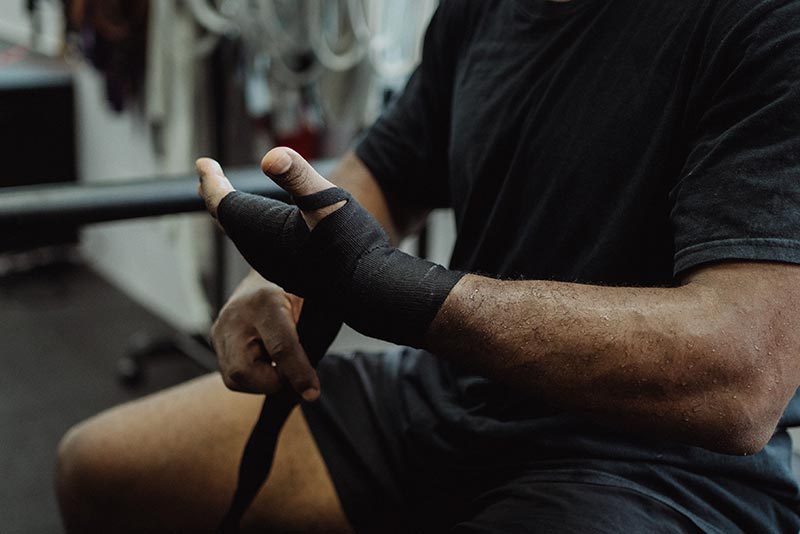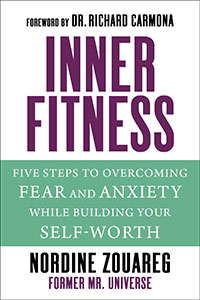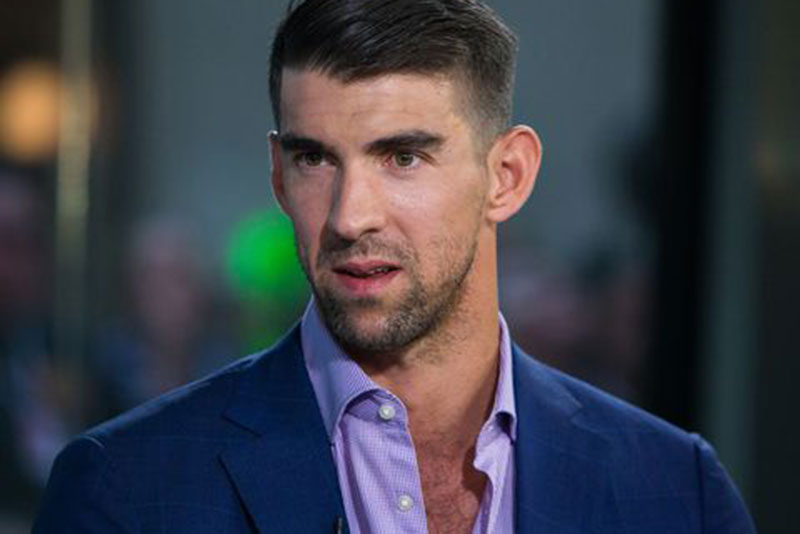By Nordine Zouareg | CONTRIBUTOR |
What do Naomi Osaka, Simone Biles, and Michael Phelps, to name a few of our talented and extraordinary athletes, have in common? They all suffer from mental health issues and are very sensitive individuals. They are preys to social media predators and are afraid of confronting the nasty social media trolls.
We know what’s out there and what’s been said about them. But do we know how these incredible beings feel inside? Is it safe to say that no one knows, not even their therapist? One thing for sure, what’s written about them is none of our business, or is it? The attempt to assassinate their character is unfair and inappropriate! But this is the world of social media where dignity, integrity, and honesty are rare commodities. Welcome to the world of virtual unreality!

As a former professional athlete, I have competed in high-level competition. Winning several titles such as the European Championship, World Bodybuilding Championship, and the Mr. Universe. I believe that a true champion must also be a champion of life.
Although there is a tremendous focus on the physical part of our training, we must also be fit mentally, emotionally, and spiritually. Equilibrium is important to peak performance. I long learned that the difference between success and failure in competition and in life is the optimal balance for peak performance. Athletes experience an enormous amount of stress they must be able to manage, not only when performing but also in their private lives.
Stress keeps us performing at top levels, but our susceptibility to stress depends on our ability to distinguish the source. Not all stress is bad. When the body uses stress to overcome fatigue or to enhance performance, the stress is positive, challenging and, therefore, healthy. Stress is good when it forces us to adapt and warns us if we are not coping well and if an immediate lifestyle change is necessary to maintain optimal health. This action-enhancing stress gave me, as an athlete, the competitive edge. This I call eustress.

Unfortunately, bad stress is inevitable, as we live in a world ruled by social media. Being in the spotlight can create a potentially devasting outcome for anyone who may be prone to mental health issues. Fortunately, there are ways to counter shame, anxiety, humiliation, and character assassination, to name a few negative effects.
Social Media Induced Stress & Stigma
It’s undeniable, social media has its place in this fast-paced society, — it’s a force to reckon with— but only if it inspires, educates, and elevates the masses. We must, however, not ignore the fact that social media platforms can be also used — as we’ve seen it before —to destabilize entire countries, influence the outcome of an election, intimidate, and spread fake news, just to name a few very negative utilizations of social media platforms.
Unfortunately, as much as social media can help with athletes’ career and image, it can destroy it just as quickly—and that’s tragic. Social media induced stress is dangerous. Not only does it create needless tension, anxiety and sometimes fear triggered by trolling, intimidation, attacks, and threats, but it can affect the athlete’s loved ones.
I recall an unfortunate and humiliating event that happened to me when I first started my career as a bodybuilder. It was during my first competition when the emcee called my name to perform my routine. Upon stepping on stage, I felt fear wrap around my whole being. I froze. Like a statue, I stood there for three agonizing minutes that felt like an eternity.
People expected me to perform my posing routine and flex my muscles, but I was unable. This prompted a few disappointed and angry members of the audience to boo, hiss, yell, and some even threw soda cans at me. I felt horrified! Obviously, the memory of that event remains engraved in my psyche. Looking back, and although this experience triggered so much pain, it also helped me with my resolve and sense of self-worth.

I had to go through a process of letting go by accepting, understanding, and surrendering. As my father always said: “When you fall to the ground, you either let fear keep you down or get up and keep fighting!” I felt to the ground indeed, again and again. I could learn from my challenges through my determination to fight for what I believed in. It is your sense of self-worth that fuels your mental and emotional strength and allows you to retreat, take a step back, and renew your commitment to succeed, then get back to battle.
Use the Bullies as Inspiration, and as Teachers
It’s not what happens to us that matters, but how we deal with it that does. Social media trolls, bullies, negative people, all have one thing in common, they’re afraid. I love this quote from Plato: “Wise men speak because they have something to say; fools because they have to say something.”
We humans can be very mean to each other, but when we find the courage to tap into the being part of ourselves, a love state of being, we can be kind to one another. Compassion, understanding, and love are powerful emotions that can bring people towards unity instead of division. If you find yourself broken by others’ perception of you, remember that it’s virtually impossible to know how one can feel, think, or behave unless they’re you. Which they’re not! These people are our best teachers, because they’re spending time on you—positively or negatively—means that you are important.
How can you learn from someone who thinks you’re perfect? You gain awareness from those who don’t like you. Someone says your hair looks bad, who cares? Someone else says you look great, who cares? You see what I’m getting at. You’re not your hair! You’re not your body! You are you! Next time you read something nasty or nice on social media, let your emotion flow for 90 seconds, feel it, be happy or angry, but don’t push it down! Then move on with your passion, your mission, or your purpose. Just be you, not them! Live by your own script, not theirs.
“ Holding onto anger is like drinking poison and expecting the other person to die.”
– The Buddha
You Have Nothing To Gain From Reacting
As I wrote earlier in this article, life is not about what happens to you, but how you deal with what happens to you. You can deliver the same message or respond to a certain challenging situation with a different and fearless attitude. That’s because your thoughts trigger your feelings and emotions; they then dictate your actions. Your actions create your attitude.

When we face hard choices or difficult situations, we react. We let things take our minds on a merry-go-round, affecting us for hours, days, or even weeks. But we can also decide to take deep breaths, tune in into the present moment, so we can move on to our true purpose. The good news is we have a choice. We can decide to be proactive, to not let a nasty tweet get to us. Whatever the comment, often, there are no facts and evidence for the false claim. And even if what they say is true, you must stand responsible and calmly deal with it. Avoiding those who try to start argument, hostility, or conflict via inflammatory messages or comments on social media goes a long way towards mental and physical health.
Don’t let these internet trolls creep up from their dark holes and disturb your mental and emotional wellbeing. Just remember, it’s all about facts and evidence! Most of the time, there are none!
One should reflect upon the following quote by Plato: “Be kind, for everyone you meet is fighting a hard battle.” Does this mean I’m asking you to be nice to the bullies, the trolls, or the mean-spirited individuals who are engaging in a negative smear campaign? Absolutely not! What I’m suggesting is that one must gain the wisdom to understand that those individuals may be locked in a negative and fearful mindset, they’re suffering! Not engaging in their fear is not only wise but also healthy.
We all have the potential for being good, or bad: don’t let anyone bring out the worst out of you.
“NO MATTER WHAT, IT HAS NO POWER OVER YOU”
Here’s how you can identify if you are reacting (being angry) or responding positively (being proactive):
Reactive (standing in opposition):
- You are letting outside circumstances disturb your inner peace.
- You are attached to the outcome and your behavior is driven by fear.
- You are distracted, ineffective, and unable to find positive solutions.
Proactive (surrendering):
- You are remaining engaged with the situation at hand but detaching yourself from the outcome.
- Your behavior is calm and peaceful.
- You are focused and effective.
Negative Feelings: The Killer of Peak Performance
Jill Bolte Taylor, a brain scientist and best-selling author of A Stroke of Insight, explains in her book that when someone reacts to something in their environment, there’s a 90-second chemical process that takes place in the body. After that, any remaining emotional response is just the person choosing to stay in that emotional loop.

Something happens in the external world that triggers chemicals to flush through the body, which puts it on full alert. For those chemicals to flush out of the body, it takes less than 90 seconds. So, during that time you can watch and feel the process happening, you can feel it, and then you can watch it go away.
After that, if you continue to feel fear, anxiety, anger, etc., you can actively choose different thoughts from the ones that are re-creating the circuitry resulting in you experiencing this physiological response repeatedly.
How To Effectively Use the 90-Second Loop
Surrender to the immediate feeling by allowing yourself to experience it. Acknowledge it without owning it; it’s going to happen, anyway. However, now you know you have 90 seconds to divert your attention to a more positive and relaxing focus while your immediate physical response runs its course. You have 90 seconds to switch your thinking.
A powerful way that works for me is to take deep, slow breaths as I allow myself to connect to the present moment. But you can find your own diversion technique — do whatever you can to get through the emotion, count, step up and down or do push-ups for 90 seconds. You can also use a mantra such as, “I have more than enough time to focus and relax.” Or simply sing one of your favorite songs, out loud or in your head.
Creating Equilibrium as a Protective Shield
To feel energized and ready to overcome any challenge life throws at you, you must create equilibrium between your personal and professional life. I would argue that our successes and failures, in everything we do, depends almost entirely on how we feel.

So, are you feeling energized on most days? Are you taking the time to exercise and eat healthy? Do you spend time with friends and family? Are you taking vacations? Do you take the time to meditate, contemplate, or pray? Unnecessary stress caused by social media or otherwise can deplete us from our mental and emotional energy, hence the importance of staying neutral and avoiding conflict.
Next time you see a negative comment about you on social media, detach yourself from the desired outcome, which is to get the best of you. Connect to your self-worth and continue to make a difference in this world.
~ By Nordine Zouareg, Former Mr. Universe, Bestselling Author
| By Nordine Zouareg, Author of the book
InnerFitness |
 |
By Nordine Zouareg, Author of the book
InnerFitness
Five Steps to Overcoming Fear and Anxiety
While Building Your Self-Worth.’
Subscribe to get notifications about future articles.
About the Author: Nordine Zouareg – Contributor
Nordine Zouareg is the founder of Executive InnerFitness®, which for the past decade has helped thousands of overworked US Corporate Executives find work-life balance. As a former two-time Mr. Universe champion, an internationally acclaimed high-performance coach, fitness and wellness expert, author of the books Mind Over Body (Grand Central Publishing, 2007), and InnerFitness (SkyHorse Publishing, 2021), Nordine has made it his mission to provide effective and proven methods for maintaining both emotional and physical fitness. He has spent years understanding the unique pressures and stresses of working in high performance fields and has used his knowledge to help people tap into their ability for peak performance and ward off stress and emotional chaos. He draws on three decades of diverse experience in the fitness and wellness fields, including 10 years leading the revolutionary fitness program at Miraval Resort, the world-class destination spa in Tucson, Arizona.


